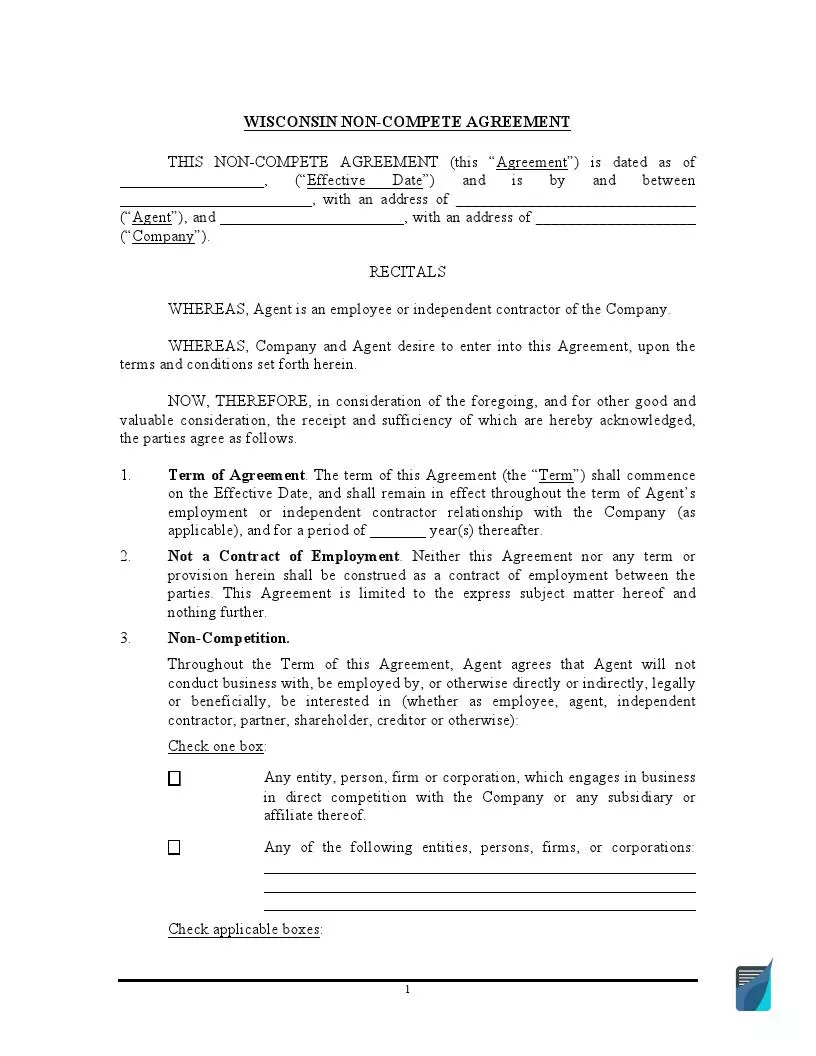Wisconsin Non-compete Agreement Template
Non-compete agreements (also known as a covenant not to compete) are common in the United States. These documents are essential for any business entity (also referred to as the “employer”). NCA forms protect the proprietary and commercial information of the subject company. Using a non-compete agreement template, a business entity restricts the worker’s professional activity in the industry, preventing them from entering into business competition with that particular entity.

Build Your Document
Answer a few simple questions to make your document in minutes
Save and Print
Save progress and finish on any device, download and print anytime
Sign and Use
Your valid, lawyer-approved document is ready
If an employee divulges confidential information to the public or uses it for their benefit, the business entity might experience severe reputation damage. Suppose non-competes are enforceable in the state, and all prescribed limitations are reasonable. In that case, the subject employee would be at least fined or asked to reimburse for losses once they violate the non-compete agreement.
Thus, some state governments encourage local businesses to complete such agreements as they eliminate the risk of the unfavorable situations mentioned above. NCAs also protect the entity even when the partnership or employment comes to an end.
A commonly generated non-compete agreement might prevent the employee from being involved with, owning, or being interested in a competing business for the agreement validity period (usually, one or two years) within the state where the employer operates. If the employer wants to restrain the employee’s actions for longer (for instance, five years), the designated geographical coverage should be relatively narrow. The restraint sensibility depends primarily on the given circumstances.
In Wisconsin, like in other states, the employer suggests a new employee signs a non-compete form at the recruitment or hiring stage. Unfortunately, you will not find any regulations on non-compete agreements, structure, and relations in Wisconsin Statutes. Therefore, we provide some recommendations on what to include in that respective document. Below is the list of sections every NCA should contain:
- Parties’ Personal Information. This includes names and physical addresses.
- These are the rights the worker has to give up under the terms of the agreement.
- The duration of the contract. The contract is usually valid for one or two years.
- Purchase option. The worker may be released from the agreement terms and liability in exchange for a designated monetary amount if the employer agrees to it.
- The subject jurisdiction. This is the name of the county, city, or state.
- Confidential information. The entity should specify which data is considered sensitive.
- Permitted disclosure.
- Penalties or remedies.
- Signatures placed by both parties.
- The signing and issuing date.
We’ve prepared some general recommendations for an employee intending to sign a non-compete. First, read the agreement carefully and ensure you understand all the restrictions and obligations. Second, let your lawyer read it and give you legal advice. Third, make a copy of the signed document and keep it where it is easy to find.
Popular Local NCA Forms
Quite a few firms frequently choose to prohibit their workers from being employed by the the company’s competing firms after their relationship comes to an end. Different states have different restrictions and policies when it comes to non-compete clauses. Below are some of the most requested local NCAs looked up by the users of this site.
Wisconsin NCA Laws and Restrictions
Before signing the NCA form, it is crucial to get acquainted with all related legal data and state requirements regulating it. In some states, there are no specific laws concerning such agreements. However, they require the covenants to be reasonable in the scope of work, duration, and geographic scope. There should be a balance between the need to protect the employer’s confidential information and protecting the employee’s ability to work and earn a living. The feasibility of such agreements depends directly on the jurisdiction of a particular state.
Luckily, in Wisconsin, the procedure for creating an NCA form and protecting the entity’s intellectual property, commercial, and other kinds of confidential information are regulated by Section 103.465 (known as “Restrictive Covenants in Employment contracts”) of the Wisconsin State Legislature.
Following the sections, any covenant generated in the state should fulfill the following requirements:
- It should protect the employer’s legitimate business interest.
- It should provide a reasonable validity period and cover a sensible geographical territory.
- The agreement terms should be reasonable to the employee and not contradict the general public interest.
If any part of the document is considered unreasonable, the entire document is automatically recognized as invalid or void.
Unlike the courts in other states (for example, Iowa court), the Wisconsin courts do not demonstrate dislike towards non-competes and accept such documents as a legal way to maintain balance in business relationships.

Check out our builder to customize any template on our website to your requirements. Here is a group of some other printable Wisconsin documents we provide.
Other NCA Forms by State
